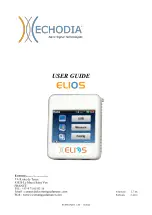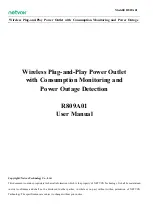
User guide
ELI
O
S
ECH001XN111-A4 – 07/2022
5
Chapter 1
Information and safety
1.1
About this manual
This user and maintenance manual is published to help you to get started with your
ELI
O
S
device from the initial
receipt, through commissioning, use and maintenance.
If you have any difficulty in understanding this manual, contact your dealer/distributor or the manufacturer, Élec-
tronique du Mazet.
This document must be kept in a safe place, protected from atmospheric agents, where it cannot be damaged.
This document ensures that the devices and their documentation are technically up-to-date at the time of marketing.
However, we allow ourselves to make changes on the device and its documentation without any obligation to update
these documents.
In the case of transfer of the device to a third party, it is mandatory to notify Électronique du Mazet about the new
owner information’s. The device must be provided to the new owner with all documents, accessories and packaging.
Only staff aware of the content of this document are allowed to use the device. If the instructions contained in this
document are not followed, Électronique du Mazet and its distributors disclaim all responsibility about consequences of
accidents or damage on staff or third parties (including patients).
1.2
Presentation of the device
ELI
O
S
is designed for screening, documentation, monitoring and diagnosis of hearing functions. It is intended for
ear, nose and throat specialists, neurologists, audiologists, pediatricians and other health professionals practicing in pri-
vate practice or in a hospital environment. The hearing of a subject can be assessed in a subjective way thanks to the
audiometry test, or in an objective way, without asking for the subject participation, via the evoked potential or the pro-
voked otoacoustic emissions.
The audiometry is a behavioral examination allowing to quickly assess the hearing acuteness. Via an acoustic stimu-
lator, sounds, words or sentences with various sound intensities are presented to the subject. The subject reports his or
her perception to the operator who can, according to the test used, determine an absolute threshold of perception or an
intelligibility threshold.
The evoked potentials term refers to the collection of the electrophysiological activity induced by acoustic stimuli. It
allows the diagnosis of neurosensory and retrocochlear damages.
The provoked otoacoustic emissions term indicates the collection in the external auditory meatus of a sound wave
induced by an acoustic stimulation. These sounds of low amplitude are the reflection of the smooth running of the external
hair cells active mechanisms. They allow the diagnosis of the neurosensory damages but also pressure disorders of the
internal ear.
ELI
O
S
is based on a system of measures modules, which can be entirely purchased from the acquisition of the equip-
ment or be added in a later update.





































